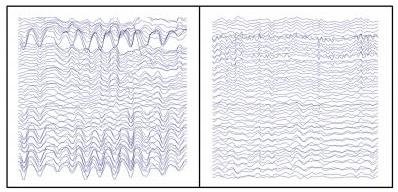CHAMPAIGN, Ill., Oct. 24 (UPI) -- A recording of brain waves can be used to predict who will improve most on an unfamiliar video game, researchers at the University of Illinois report.
Using electroencephalography to record electrical activity in the brains of 39 study subjects as they began playing Space Fortress, a video game developed for cognitive research, researchers found subjects whose brain waves oscillated most powerfully in the alpha spectrum -- about 10 times per second, or 10 hertz -- tended to learn at a faster rate than those whose brain waves oscillated with less power.















